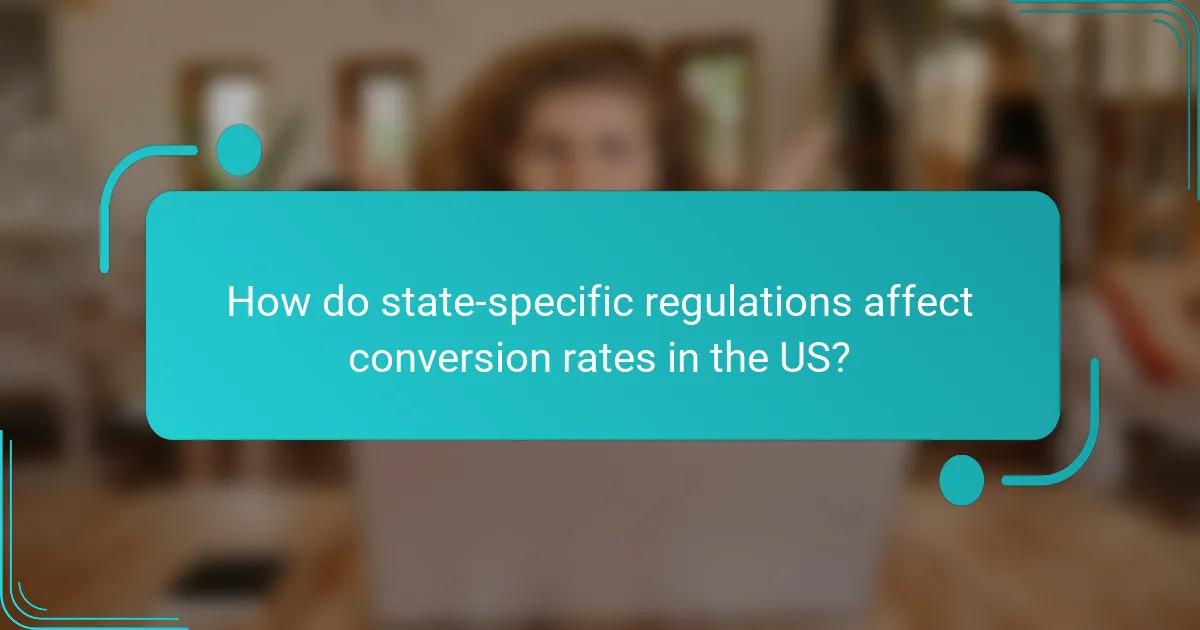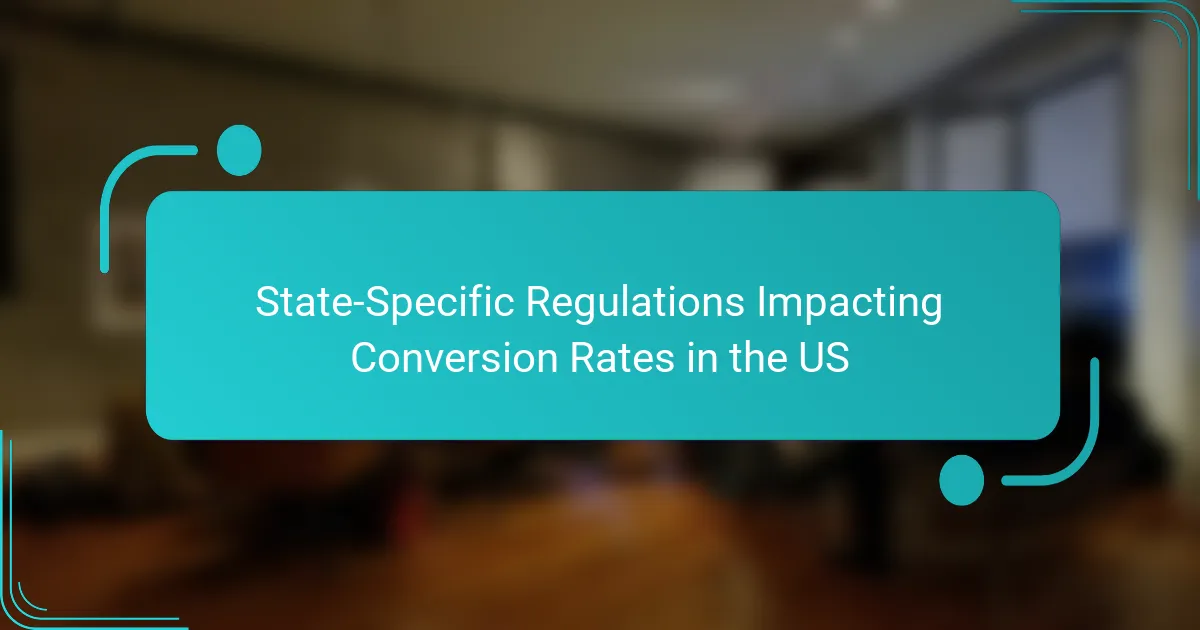State-specific regulations play a critical role in shaping conversion rates by affecting how businesses interact with consumers. Compliance with these laws, particularly those related to consumer privacy and data protection, can either enhance transaction efficiency or create obstacles that hinder customer engagement. Understanding the nuances of regulations in states like California and New York is essential for businesses aiming to optimize their conversion strategies while remaining compliant.

How do state-specific regulations affect conversion rates in the US?
State-specific regulations significantly impact conversion rates by influencing how businesses operate and engage with consumers. Compliance with these regulations can either facilitate smoother transactions or create barriers that deter potential customers.
Impact of regulations on online sales
Regulations can dictate various aspects of online sales, including pricing transparency, data privacy, and consumer protection. For instance, states like California have stringent data privacy laws that require businesses to disclose how they collect and use personal information. This can lead to increased operational costs, which may affect pricing strategies and ultimately conversion rates.
Additionally, regulations around sales tax can vary widely across states, impacting the final price consumers see. Businesses must ensure they are compliant with each state’s tax laws, which can complicate the checkout process and potentially lead to abandoned carts.
Consumer trust and compliance
Compliance with state regulations can enhance consumer trust, as customers feel more secure when they know their rights are protected. For example, states that enforce strict return policies or warranty requirements can encourage purchases by reassuring consumers about their buying decisions.
On the flip side, non-compliance can lead to negative perceptions and reduced trust, which can significantly lower conversion rates. Businesses should prioritize transparency and clear communication regarding their compliance efforts to foster a positive relationship with consumers.

What are the key regulations by state?
Key regulations impacting conversion rates vary by state, focusing primarily on consumer privacy and data protection. Understanding these laws is crucial for businesses to ensure compliance and optimize their conversion strategies.
California Consumer Privacy Act (CCPA)
The California Consumer Privacy Act (CCPA) grants California residents specific rights regarding their personal information. Businesses must disclose what data they collect, allow consumers to opt-out of data selling, and provide access to their data upon request.
To comply with CCPA, companies should implement clear privacy policies and ensure that data collection practices are transparent. Failure to comply can result in significant fines, which can reach up to $7,500 per violation.
New York’s SHIELD Act
New York’s SHIELD Act enhances data security protections for residents by requiring businesses to implement reasonable safeguards for personal data. This includes conducting risk assessments and ensuring that third-party vendors also comply with data protection standards.
Businesses should regularly review their data security measures and training programs to align with the SHIELD Act’s requirements. Non-compliance can lead to penalties and increased liability in case of data breaches.

Which states have the most stringent regulations?
California and New York are often recognized for having the most stringent regulations that can significantly impact conversion rates. These states enforce strict consumer protection laws and data privacy regulations that businesses must navigate carefully.
California
California’s regulations, particularly the California Consumer Privacy Act (CCPA), impose strict guidelines on how businesses collect and manage consumer data. Companies must provide clear disclosures about data usage and allow consumers to opt-out of data sales, which can affect conversion rates if not handled properly.
To comply, businesses should implement transparent data practices and ensure user consent is obtained effectively. Failure to comply can lead to substantial fines and damage to brand reputation, ultimately impacting sales and conversions.
New York
New York has its own set of stringent regulations, including the New York Privacy Act, which enhances consumer rights regarding personal data. This law requires businesses to provide detailed information about data collection and usage, similar to California’s regulations.
Businesses operating in New York should prioritize user privacy and ensure compliance with these laws to avoid penalties. Effective strategies include updating privacy policies and training staff on data handling practices, as non-compliance can lead to significant legal repercussions and hinder conversion efforts.

How can businesses adapt to these regulations?
Businesses can adapt to state-specific regulations by implementing compliance strategies and seeking legal consultation. These steps help ensure adherence to local laws, which can significantly impact conversion rates.
Implementing compliance strategies
To effectively implement compliance strategies, businesses should first conduct a thorough assessment of applicable regulations in their state. This includes understanding data privacy laws, advertising standards, and consumer protection regulations that may affect operations.
Next, develop a compliance checklist tailored to your business model. This checklist should outline necessary actions, such as updating privacy policies, ensuring transparent data collection methods, and training staff on compliance requirements. Regular audits can help maintain adherence to these strategies.
Utilizing legal consultation
Engaging legal consultants who specialize in state regulations can provide invaluable insights for businesses. These professionals can help identify potential legal pitfalls and recommend best practices for compliance, ultimately enhancing conversion rates.
Consider establishing a relationship with a legal advisor who understands your industry and local laws. This partnership can facilitate timely updates on regulatory changes and ensure your business remains compliant, reducing the risk of penalties that could hinder conversion efforts.

What tools can help monitor compliance?
Monitoring compliance with state-specific regulations is essential for optimizing conversion rates. Tools like OneTrust and TrustArc provide comprehensive solutions to ensure adherence to privacy laws and regulations across various states.
OneTrust for privacy management
OneTrust is a leading platform for privacy management that helps organizations comply with various regulations, such as CCPA and GDPR. It offers tools for data mapping, risk assessments, and privacy impact assessments, enabling businesses to identify and mitigate compliance risks effectively.
OneTrust’s user-friendly interface allows for easy integration with existing systems, making it simpler to manage consent and preferences. Companies can automate compliance tasks, reducing manual effort and minimizing the risk of errors.
TrustArc for compliance solutions
TrustArc provides a suite of compliance solutions tailored to help businesses navigate complex privacy regulations. Its platform includes features for managing privacy assessments, data inventory, and compliance reporting, which are crucial for maintaining transparency with customers.
With TrustArc, organizations can leverage its extensive library of templates and tools to streamline compliance processes. This can lead to improved efficiency and a stronger reputation for privacy protection, ultimately enhancing customer trust and conversion rates.

What are the emerging trends in state regulations?
Emerging trends in state regulations are significantly influencing conversion rates across the United States. Key areas of focus include heightened data privacy measures and the expansion of consumer rights, both of which are reshaping how businesses interact with customers.
Increased focus on data privacy
States are increasingly implementing stringent data privacy laws that require businesses to handle consumer information with greater care. Regulations like the California Consumer Privacy Act (CCPA) and similar laws in other states mandate transparency in data collection and usage, compelling companies to adopt more robust privacy practices.
Businesses must ensure compliance by updating privacy policies, implementing data protection measures, and providing consumers with clear options to opt-out of data sharing. Failure to comply can lead to significant fines and damage to brand reputation.
Expansion of consumer rights
Consumer rights are expanding in many states, granting individuals more control over their purchases and interactions with businesses. This includes the right to request refunds, the ability to dispute charges easily, and protections against misleading advertising.
Companies should familiarize themselves with local regulations to avoid legal pitfalls. Offering clear return policies and transparent pricing can enhance customer trust and improve conversion rates. Additionally, businesses should be prepared to handle increased inquiries related to consumer rights effectively.

How will future regulations impact affiliate marketing?
Future regulations are set to significantly influence affiliate marketing by imposing stricter compliance requirements and altering the landscape of consumer data usage. Marketers must adapt to these changes to maintain effective conversion rates and ensure legal adherence.
Data Privacy Regulations
Data privacy regulations, such as the California Consumer Privacy Act (CCPA) and the General Data Protection Regulation (GDPR) in Europe, are reshaping how affiliate marketers collect and use consumer data. These laws require transparency in data handling and give consumers more control over their personal information.
Marketers should ensure they have clear consent mechanisms in place and provide easy opt-out options for consumers. Non-compliance can lead to hefty fines and damage to brand reputation.
Advertising Standards
Advertising standards are becoming more stringent, with a focus on truthfulness and transparency in marketing claims. Affiliates must ensure that their promotions do not mislead consumers, which can lead to regulatory scrutiny and penalties.
To comply, affiliates should review their marketing materials regularly and ensure that all claims are substantiated. Clear disclaimers and honest representations can help avoid potential legal issues.
State-Specific Regulations
Each state in the U.S. may implement its own regulations affecting affiliate marketing, which can create a complex compliance landscape. For instance, states like California and New York have specific laws that affiliates must follow, which may differ from federal regulations.
Affiliates should stay informed about state-specific laws and consider consulting with legal experts to navigate these requirements effectively. This proactive approach can help mitigate risks and enhance trust with consumers.
